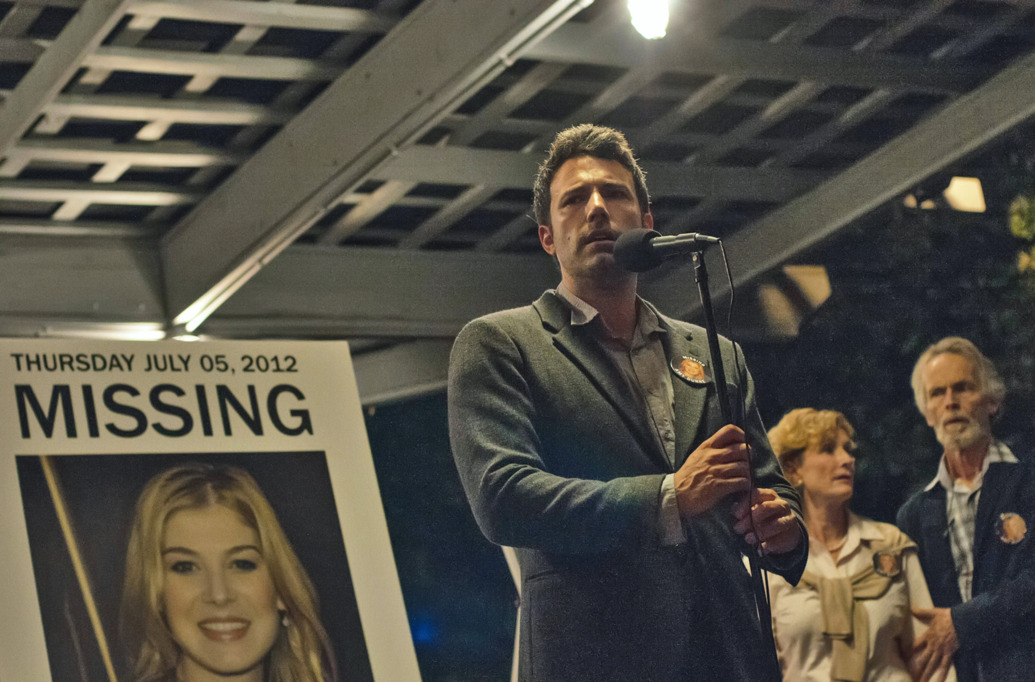David Fincher is one of the most talented and stylized directors working today. His movies, no matter the subject matter, elevate whatever source material Fincher is given with technical excellence. Ben Affleck smartly left the direction of Gone Girl to Fincher, who, like the main couple in the story, seems a little too perfect for the part. Gone Girl in the wrong hands would be a cheap whodunit, but in Fincher’s, it is a dark, haunting tale that punches viewers in the gut. Especially anyone on the Eagle Forum.
I’d go into Gone Girl cold, so SPOILER ALERT AHEAD if you plan on seeing it. On paper, Nick (Ben Affleck) and Amy (Rosamund Pike) Dunne are a run of the mill happy couple. Until the 5th of July, when Nick returns home to find Amy missing. Nick calls the police, and detectives Boney (Kim Dickens) and Gilpin (Patrick Fugit) immediately start to see some issues with Nick’s story. Why does Nick not know if his wife has friends? Why is blood left around the house in weird spots? In addition, Amy’s public past leads the press to jump all over the story, leading Nick into being the fall guy. With nowhere else to go, Nick moves in with his sister Margo (Carrie Coon) to try to clean up this mess and figure out what the hell happened to his wife.
Fincher’s handprints are all over Gone Girl, even though Gillian Flynn adopted her own novel. The sets all feel like dream sequences. Perfect house. Perfect kitchen. Perfect bedsheets. However, Fincher shoots a look of peek around doorway shots, and coupled with Trent Reznor and Atticus Ross’s score, Gone Girl feels off and disquiet. Early on, Fincher establishes that these two are writers, and gives us hints of their inner monologues. Smartly, the voice overs have this artificial quality, as if their words don’t quite match the story they are telling; when the real world comes crashing back in, the voices go back to normal. These little touches subtly compound to immerse Gone Girl in unease and unreliability, even before the story kicks in.
Gillian Foley’s screenplay of her book contains a strong combination of pointed commentary and zig-zag storytelling. The central mystery of Amy’s disappearance gets solved about an hour in, but that hour spends its time using media and well-conceived perception to paint a picture of how events went down and who is to blame for the disappearance. Gone Girl then goes on for another hour and a half, but that time is used by letting the reverberations of the big reveal force the main characters to reshape the story to gain the upper hand and find a way out of the precarious situation they all find themselves in. Using media to change a narrative gives Gone Girl a freshness and relevant take on the thriller.
Ben Affleck had me worried for a second. Acting isn’t his best profession in the movies (Writer/Director better suit him), and he has every right to coast on his Oscar and Batman moniker. However, Affleck inhabits the everyman Nick Dunne quite smoothly. With all due respect to the new Caped Crusader, Rosamund Pike is the best masked figure. Pike gives Amy an ephemeral quality in every scene she is in; at any point I had no idea where her head was and what Amy’s endgame was going to be. Pike effortlessly transitions between sexpot, forlorn wife, and D-lister which Gone Girl requires her to play. Tyler Perry gets to take off a wig and elevate the material as a high powered lawyer of Nick’s. Neil Patrick Harris, Carrie Coon, and Kim Dickens are also very good in supporting roles.
Gone Girl is NOT a date movie. The story is pretty dark and out on the pains of being married. Mental and physical infidelity is everywhere. And nihilism and self-interest permeate through David Fincher’s direction. If any of you who went on a first date to see Fincher’s Social Network, make sure you pick another Fincher movie to propose at.

